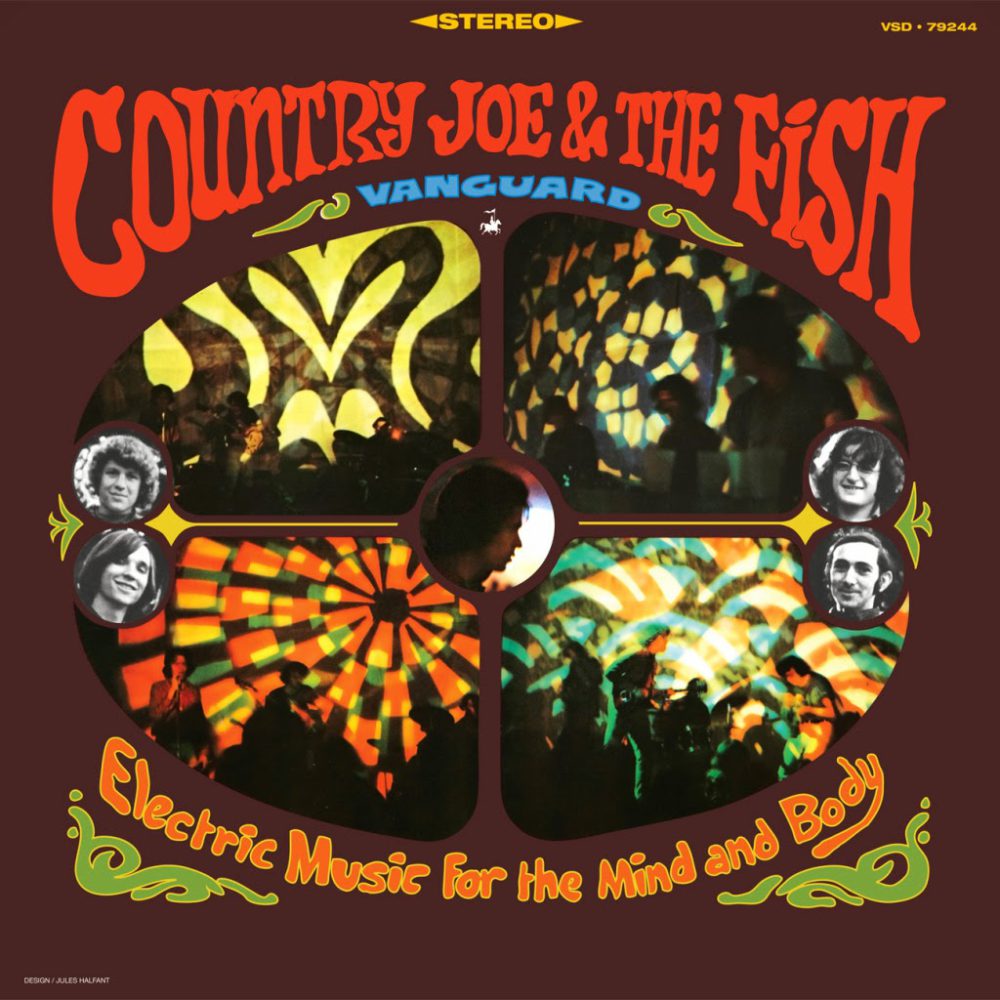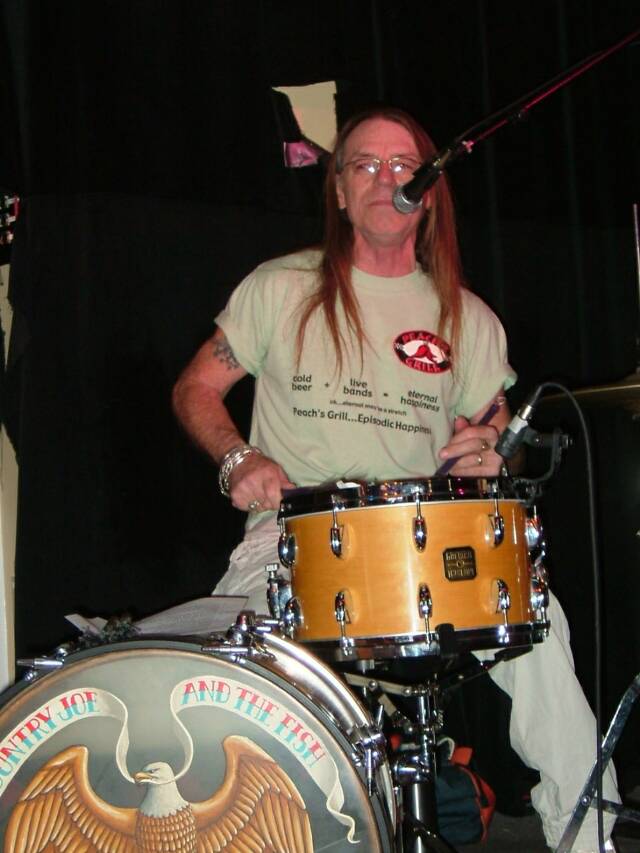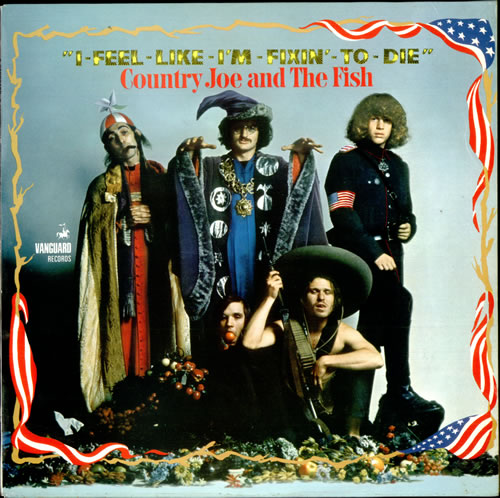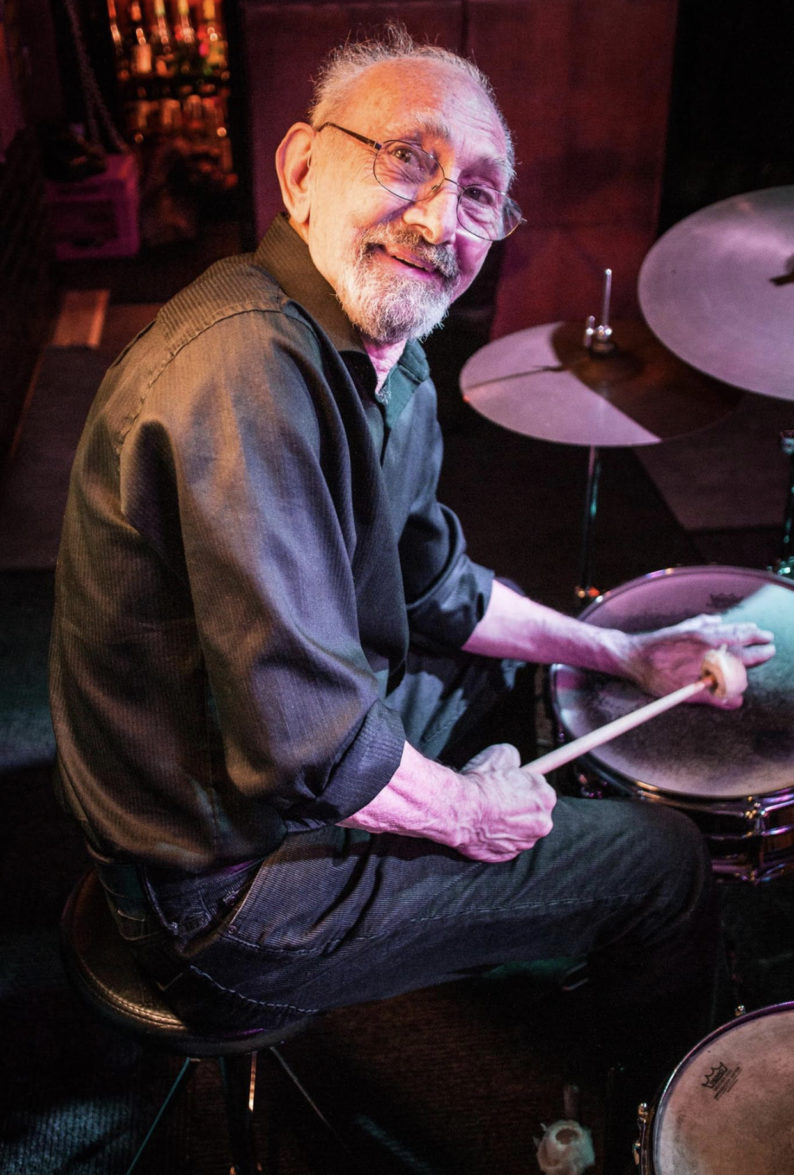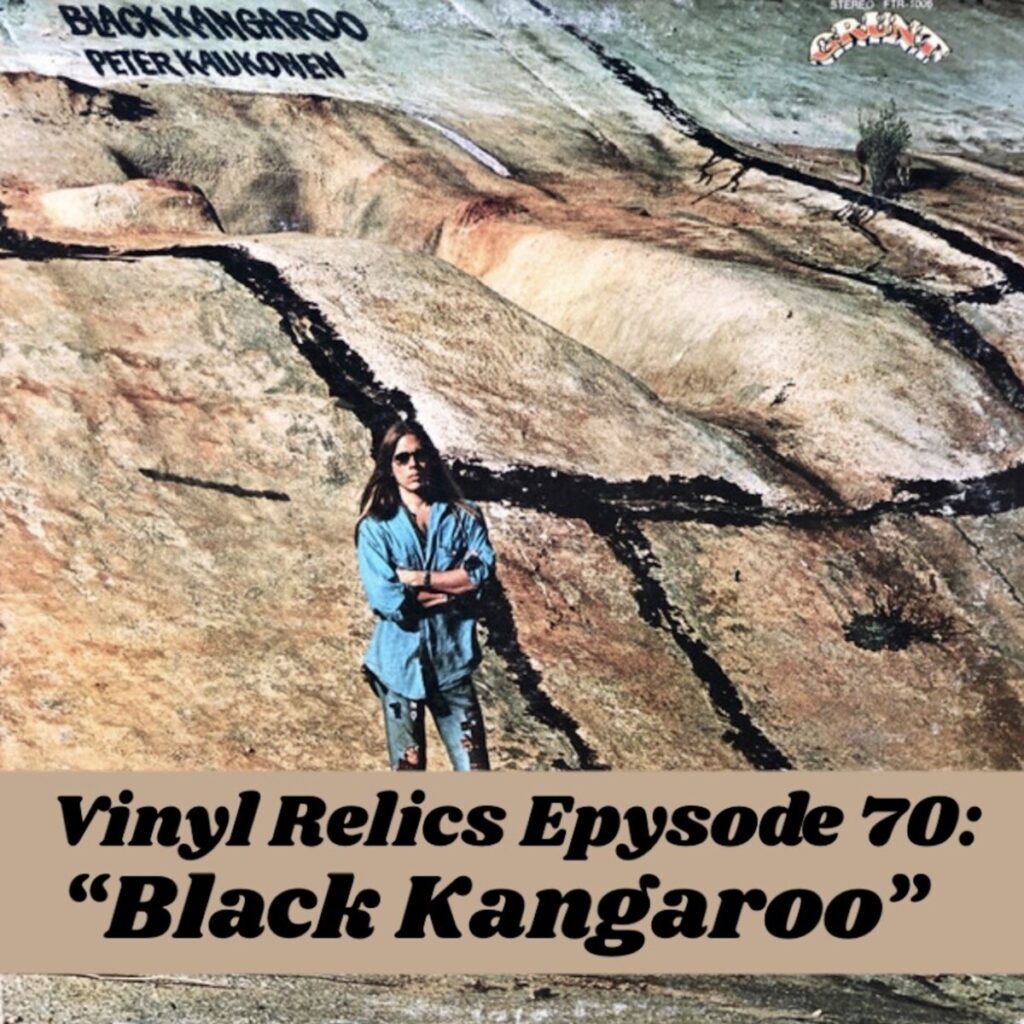Interview: Chicken Hirsh of Country Joe and the Fish
Interview: Chicken Hirsh of Country Joe and the Fish
Chicken Hirsh, was the drummer for the sixties psychedelic band Country Joe and The Fish from their classic debut Electric Music For The Mind and Body through their Together album. Examples of Chicken Hirsh’s classic drumming style can be heard on tracks like “The Masked Marauder” from their first LP and “Eastern Jam” from their 2nd. In 2004, I caught up with Chicken who was on tour with the Country Joe Band at the time, which included a majority of the members of the Fish from their first record. Sadly, Chicken passed away at age 81 in his hometown of Ashland, Oregon on August 17th, 2021. A four LP box set entitled The Wave of Electrical Sound, recently released, includes both mono and stereo mixes of the first 2 albums. Below is a never-before published phone interview I did with Chicken. In memoriam.
Bassam Habal: You’re living out in an Ashland these days?
Gary “Chicken” Hirsh: Yeah. Ashland, Oregon.
Bassam Habal: Tell us about the current version of the Country Joe Band and how that reunion came into play?
Chicken Hirsh: Well, it’s a little over a year that we put it back together again, it just seemed like the right time in our lives. It’s been, I mean, you know, since 19, what 1969/’70 that this band has played together. And it was an amazing journey back then. This particular band was pretty tight back in the day. And so we all signed on with the original members pretty much. Country Joe, and The Fish was sort of an organic band to begin with. It evolved out of a Marxist/Leninist magazine at the college in Berkeley, and became a jug band, and then evolved into an electric band, which is when I pretty much joined right before the first album. So it was an evolution for sure. And us
I mean, it’s like you go to England and half the people in the audience are musicologists. They know more about us than we do.
getting together, it was just time. You know, we’ve been in touch and we wanted to make some statements, politically and socially. We played one gig where they referred to us as, “They’re in their 60s and they’re from the 60s.” That was pretty cool. And it’s everybody signed on except our lead guitarist Barry Melton. What happened was Barry is a very busy attorney, and he’s the head of the public defender’s office in Yolo County, California. So he’s got a job that makes it pretty difficult for him to get off and travel and although he continues to play, it’s pretty much on his own schedule. So Barry’s not on board and Barry sort of ended up with the name “The Fish”. We call ourselves The Country Joe Band, but it’s pretty much the original members of Country Joe and The Fish minus Barry.
Bassam Habal: Any chance of Barry joining you on a West Coast date?
Chicken Hirsh: Well, that’d be sweet. You know that. That’d be sweet. But it’s it’s pretty tough to put it together right now. His schedule and then there’s there’s always, you know, issues, old issues coming up again. But in spirit of, you know, what this band was about, I would love it and I know the other guys would love to have Barry just because of, you know, just the spirit of it and that’s a big part of, you know, what we are right now is the four of us. It’s more fun in in a way that’s that’s really interesting. I mean, you know, back in the day was sex, drugs, and rock and roll. You know, we’re a little bit more mature and there’s a camaraderie. We’re just cracking each other. It’s non-stop reminiscing and cracking up and the music’s great. If you’re a musician, you keep going, you know, and you get better at whatever it is you were doing back then, you hone it. You get it to a point where you know what you’re doing. And so getting together musically has just been a mind blower. It’s just a lot better and it’s a lot more, the comfort zone, you know, of getting on stage with these guys. It’s great and, being a musician, you get on stage with people, and it’s always different, the relationships, playing styles and approaches but with the four of us, the comfort zone is definitely there. It’s nice going onstage that way.
Bassam Habal: I saw you last August down at the Cape Cod melody tent.
Chicken Hirsh: Oh, yeah. That was really fun
Bassam Habal: That was that was really outstanding. And I guess that was your one East Coast date. Correct me if I’m wrong.
Chicken Hirsh: That was part of a tour. We were on our way to a Woodstock reunion. Actually, I think the Cape Cod gig was the first stop on that tour. We did a bunch of dates on the East coast. The Cape, man, I love the Cape. I remember the Cape from the 60s. I spent a fair amount of time there. Love it. That’s beautiful spot. I’d like to be there right now.
Bassam Habal: I know you went to to England and recorded a DVD that should be coming out.
Chicken Hirsh: Yeah, that should be coming up in the next month or so. I think it’s a July release. And actually we go back to England in August for a couple of weeks. Looking forward to that. We’re going to play Scotland, Inverness and Scotland. That’s going to be fun. But right now, we’ve got to continue to go do what we call one-offs, where you go and fly out for a weekend and play a gig and it’s hard to get
I think we were all on acid at the Monterey Pop Festival.
everybody together. David Cohen is a New Yorker. Bruce and Joe are in the San Francisco Bay Area and I’m up here in the great Northwest. So we’re sort of scattered and getting together takes a little bit of planning and so right now, next year, I think we’re working on some Northwest stuff. But you know, the winds of fate, and promoters or booking agents, get something and we’re alerted.
Bassam Habal: How do you like playing overseas?
Chicken Hirsh: Oh, it’s amazing. The overseas audience is, it’s a different audience. I mean, it’s like you go to England and half the people in the audience are musicologists. They know more about us than we do. Yeah, it’s great. They have great audiences there. They love American bands, American music, the blues. They are more enthusiastic in a lot of ways than, American audiences although the American audiences have been, the people that have been coming to our shows are pretty appreciative. For the most part, it’s the people from the day and people that have heard of us and then never seen us because they’re too young to come out. So you know, you get to see these little guys that, you know, you’ve heard stories about or whatever. It’s been great. The audiences have been wonderful. And that’s always nice to go out there and get that response. You play better.
Bassam Habal: Tell us about the title of the song “Bass strings” from the first LP
Chicken Hirsh: Well, bass strings was our code word for marijuana back in the day. So that’s the inside joke that had nothing to do with bass strings. Yeah, “Bring the bass strings”, “You got any bass strings?” The band had its own whatever, so we called the tune “Bass Strings.” It’s actually the slow sort of spaced out blues.
Bassam Habal: Country Joe once told me the band “tested” out the first album to confirm it’s psychedelic affects. Is that true?
Chicken Hirsh: Yeah, we quite often partaked in experimental experimenting with our consciousness. Yeah, we played in that state as well which is an interesting and pretty, at this point in my life, I think we were all on acid at Monterey, the Monterey Pop Festival. I mean that was pretty risky, pretty risky activity. I remember one gig we played in Vancouver BC, where we were in that state. And we went into our single, “Sweet Lorraine”, which was like three minutes and whatever, played exactly the same every time we played it. We launched into a jam that lasted the whole set in the middle of that song because we got essentially lost. It ended up an extended jam. But yeah, back in that day, though, you could get away with that. Sometimes the more out-of-tune we played, the better because the crowd appreciated that we were loose enough to stretch out or get wasted and the crowd, most of the time, was wasted back in the day. That was a big part of that time period. It works both ways. You know, it could be good, it could be bad. Marijuana is, you know, it’s a good art drug, because it helps you focus. You can get real focused on whatever and get right inside of it. The psychedelics could go either way, like Monterey, I forgot how to play the drums. I ended up playing from my elbows instead of my wrists which is an interesting way to play the drums. I guess some rock players use more arm. At any rate, I got off the stage and my elbows were aching. It was a new experience. And I realized that I forgot, I guess forgotten how to play the drums while I was up there. I knew what I had to play. You know, I had the ear. But I didn’t have the mechanics quite right. So there you are.
Habal: I understand you started off as a art major?
Chicken Hirsh: The reason I went up to Berkeley originally was to go to school, to the California College of Arts and Crafts which is located in Oakland/Berkeley. That was early 60s, very early 1961/’62. So I was going to school there and playing. I was a jazz musician in those days and just started listening to some rock and roll in fact, the Beatles, Ringo Starr. The studio stuff, that was sort of interesting to me, all the textural stuff that was going on drumming. I played with a couple of rock and roll bands in the Bay Area after I left school and then ran into Barry Melton in a coffee shop. They were looking for a drummer. That’s how I joined the band. That evolution, I continue to paint. I’ve got a website, Chickenhirsh.com if anybody wants to take a look at some of the work.
Bassam Habal: Tell me about designing The Fish Game from “I-Feel-Like-I’m-Fixin-to-Die”?
Chicken Hirsh: The second album included a game, a board game that one could cut out and play and it had very strange rules as I recall. It was based on a board game that I had designed when I was in school, actually a drug game called Score. The Fish Game, somebody said that they saw it at, I think, a Walmart store back maybe 10 or 15 years ago as a poster. I don’t know how that came to be but strange things happen. But yeah, there’s even an online version, somebody took the game and put an online version. If you go to Country Joe’s website, you can find that board game. And yeah, from time to time people come up to concerts with the game, to have it signed, makes a pretty
At one point, it seemed like a good idea to try smoking bananas.
cool poster, I guess. One can actually cut out the stuff. There’s figures that you use to go around the board that are the images of the band and the costumes that we wore for the album cover, the second album cover. I guess that’s pretty different, I guess. I don’t know of any other albums that included a board game. Yeah, which is pretty cool. We we did a couple of things, our “Best of” album, the first pressing of “The Best of” album actually had a nudie cover on it. We were all without clothes. I think that was the first time that ever happened. That was just the first pressings. I guess those are sort of collector’s items. I always thought that was pretty cool.
Bassam Habal: Can you tell me about the bricks in the board game?
Chicken Hirsh: I was just finishing the art work in the game, and I had all this all this space to fill. And we were staying at the Chelsea Hotel and my room, I remember sitting there and looking out the window and nothing but red brick. It was like, all I could see was red brick. We’re in New York and so if you see a copy of the game, the original art work, all this space is filled with red brick. I just sat there, I guess I was under the influence of something, and just sat there for hours painting these red bricks.
Bassam Habal: There was a rumor your started the infamous smoking bananas trend. Tell us about that.
Chicken Hirsch: It’s one of my dubious distinctions. Yeah, I just, over the years have been trying natural substances. Because you know, you figure this hemp, this weed that grows without much problem. You can roll it up and smoke it. It seems likely and you know, and then there’s other cultures where there’s natural substances that just grow in the forest or grow someplace that can change your consciousness. One would think that there’s got to be other stuff. I’ve tried over the years different things, especially in back in the day. I’ve sort of given up the quest at this point in my life, but at one point, it seemed like a good idea to try smoking bananas. And the idea that, I just liked the idea that it should work. There’s something about it that’s just funny. It’s a kick. And so I tried the drying out the skin and smoking it and my first thought was that it was a pretty good smoke, unlike most of the other things that I’ve been trying, which made me cough a lot, and were not very good and wouldn’t stay lit or you know, there was some problem with the smoking of it. The banana, actually, the banana joint was a pretty good smoke. But the problem was that it was hard to tell if it did anything because at the time that I was drying all the banana skins and smoking, it seemed like it was working but it was hard to tell because I was usually doing other stuff at the same time. But then, on the way up to a gig in Canada, I was sitting next to Joe on the airplane and I suggested that I had been trying the banana skins and and they were working. So we dried out some skins when we got to Vancouver. Everybody thought that, yeah, maybe it was working. Who knows? So we got back to the Bay Area and announced on the stage, I think it was Winterland that we announced it. At any rate, the following weekend, you couldn’t buy a banana any place in the Bay Area. It was like Safeway stores sold out of bananas. The Co-op in Berkeley, you couldn’t get a banana. And since then, I’ve learned that you know, it just swept the nation. It went all over the world. You know, we’ve run into people in England who tried smoking bananas. You know, the underground press jumped on it. The Federal government ended up testing to see if there was anything that in them.
Bassam Habal: Stop people from smoking bananas?
Chicken Hirsh: Right, of course. Well, yeah. And then, you know, then there’s the industry too, the banana industry and it’s a big business, bananas. So, yeah. That’s one of the things that I’m known for. There’s a fellow that’s written a very long dissertation, you know, a doctorate thesis on the banana hoax and the underground press’s involvement in it. He’s interviewed all kinds of people, plus Donovan, because some people thought that Donovan was the impetus for the banana thing because of his “Mellow Yellow” song but, apparently, that was based on some other concept. It’s credited to Country Joe and the Fish. I don’t want to give away what he was, what he was talking about. Joe and Donovan had talked about it because it was a controversy at one point. Yeah, the banana hoax is credited to Country Joe and The Fish.
Bassam Habal: What similarities do you see between your music/drumming and your art?
Chicken Hirsh: Oh, now you’re on it. That’s the biggie. Yeah. Music and Art, it’s all the same stuff – different media, different technical, physical abilities but it’s all about the same energy. And you can use the same criteria, the same aesthetic, the same approach. A lot of people talk about, as a musician, playing fast and playing loud. Those are scientific terms, you know, they don’t even exist in the world of aesthetics really. So technique applies, and, in the arts in a real interesting way because it all comes back to your voice, your own personal voice, your own content, what you’re trying to say, in terms of the goals for me. You know, obviously other people approach the arts in a different way and it can be a great circus act, or it could be an amazing athletic performance and I can get off on that. You know, I love the tightrope walker and the juggler. Then there’s, you know, the poet. There’s different ways of going at it, different ways of appreciating.
Bassam Habal: I find your drumming to be very textural at times.
Chicken Hirsh: Cool, cool. I’m glad you picked up on that because that’s what I try to do. My first approach to rock and roll was Ringo Starr’s studio work, which is all about that. Yeah, I think two dimensional artists are, there’s a frustrating limitation being a two dimensional artist because we’re in a world of movies, you know, and we’re heading toward a virtual world of 3-D. Yeah, I think photographs and painting is archaic. I mean, there’s that whole thing about, if you really want to make a statement about our time, our life and time, make a movie. I always think, Spielberg and Woody Allen, the filmmakers are the Michelangelos and Leonardos of our time, the illustrators, the real illustrators. That’s the other thing, the visualization of 3-D and movement we know it’s there. We know there’s the science to produce it but you know doing it with a pencil is tough.
Bassam Habal: What do you make of the current Iraq war and similarities to Vietnam?
Chicken Hirsh: Yeah, I mean, there’s nothing different here. We’ve been sending men off, boys off, for for no reason for a long time now. Governments over the years come up with excuses and reasons after the fact. It’s sad and it’s sorry. But this bunch of stuff, this latest bunch is ridiculous. It’s a shame. It just makes me feel very sad that we don’t teach enough history for people to know it. We need to teach history and, at some level, people know about it and it’s just gonna keep going. And right now, I’m worried about the country because communists, you knew who the communists were. Terrorists, that’s real vague and so that’s a wild card. That’s giving them a wild card. We need stuff that the country is not getting. Education is, I think, the key and that’s taken a back seat. I worry for my children and my grandchildren. So that’s what that’s about.
Bassam Habal: How did you get the nickname Chicken?
Chicken Hirsh: Well, the short answer is I am Jewish and anxious. The long answer is it was the family nickname because we were, my dad and my brother and I called each other Chicken because of an incident regarding going down a hill on a snow slide in 1947 when I was 7 years-old and it just stuck. We called each other Chick. My brother and I were the Chick nickname in high school. We lived in Chicago and I went to the West Coast and it was because I was from Chicago and a jazz musician, the name definitely stuck. It was a perfect name, Chick Hirsh. Then when I joined Country Joe and The Fish, they asked me where the name came from and I said it came, “Oh, from Chicken” cause I was Chicken. From that point on, they were announcing onstage “Chicken Hirsh” and before long I was signing contracts as Chicken Hirsh. So that’s where that came from.
Bassam Habal: Well, we are out of time, but it has been a real pleasure talking to you.
Chicken Hirsh: Thanks for the call, Slim.
Related: Interview with Barry “the Fish” Melton
The Top 100 Psychedelic Rock Artists of All Time
The 100 Best Psychedelic Rock Albums of the Golden Age
The Top 200 Psychedelic Songs from the Original Psychedelic Era
Gallery
Recent Articles
Vinyl Relics: Black Kangaroo by Peter Kaukonen
•
February 21, 2026
Podcast–Carlos Tanner
•
February 18, 2026

Loading...
